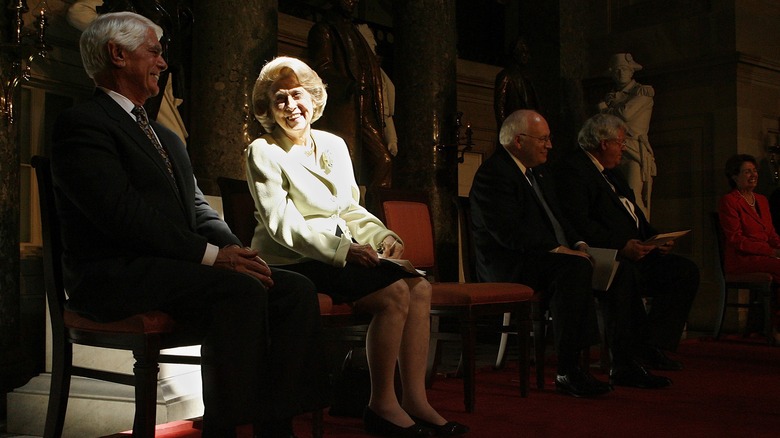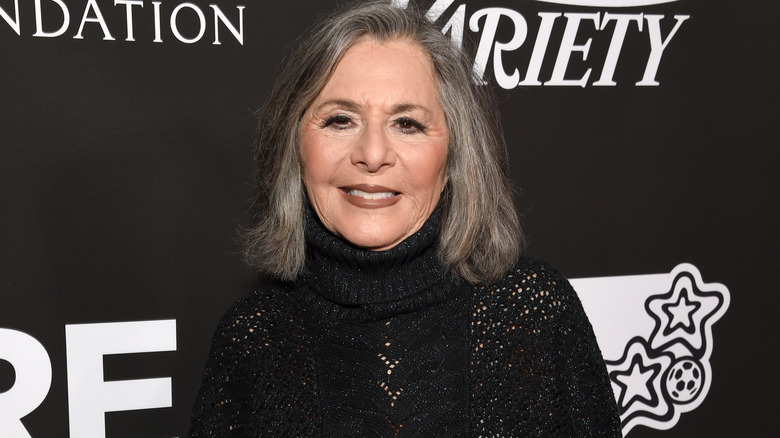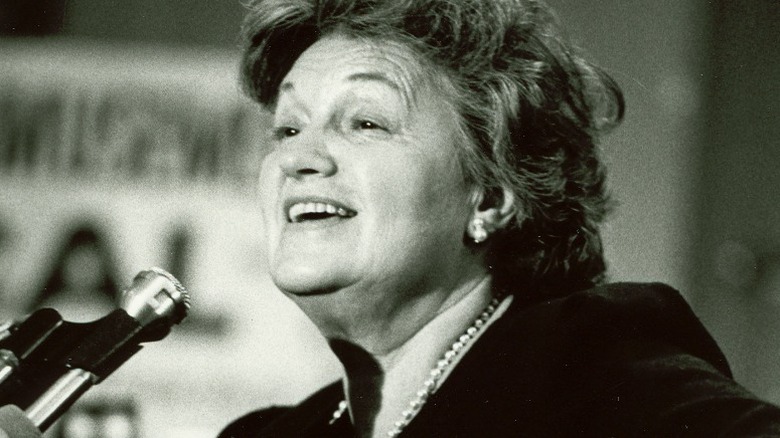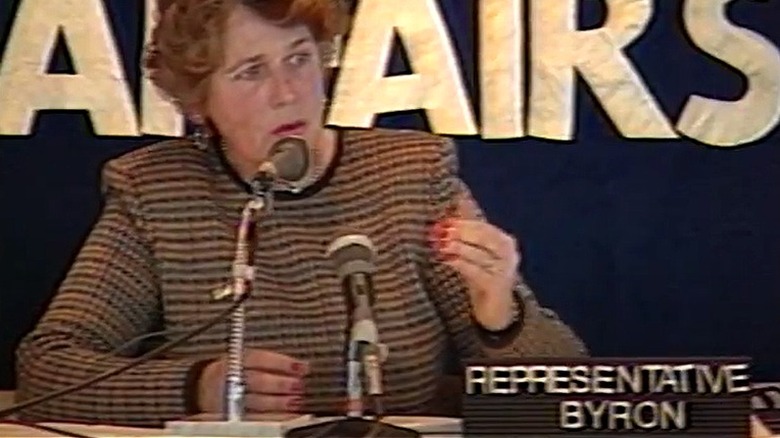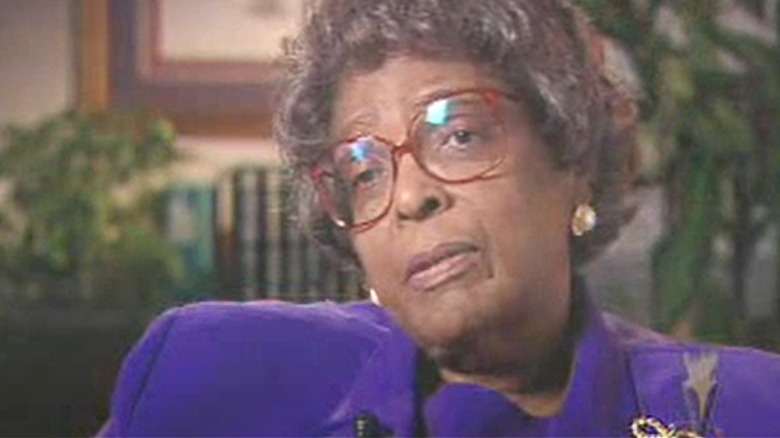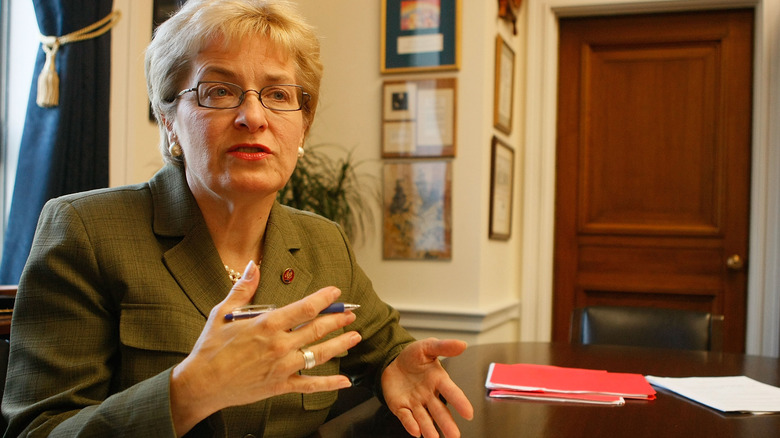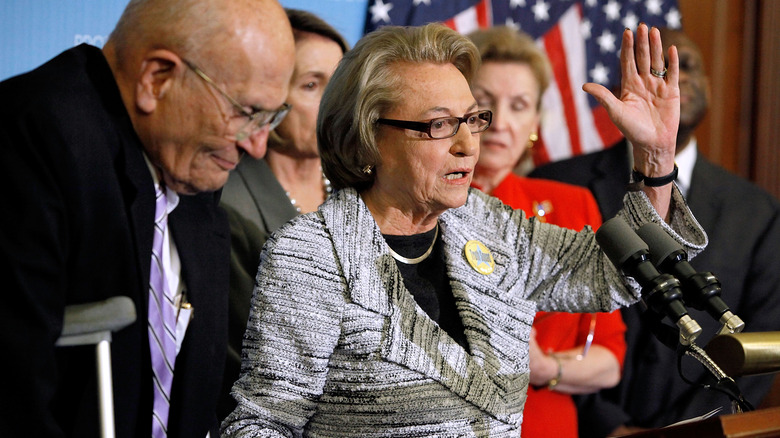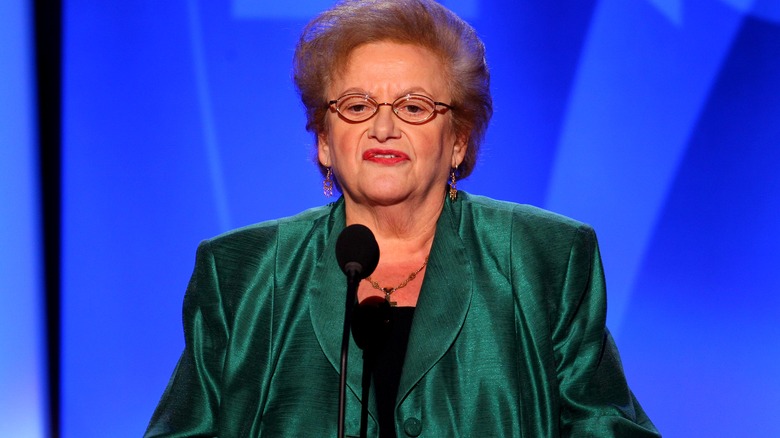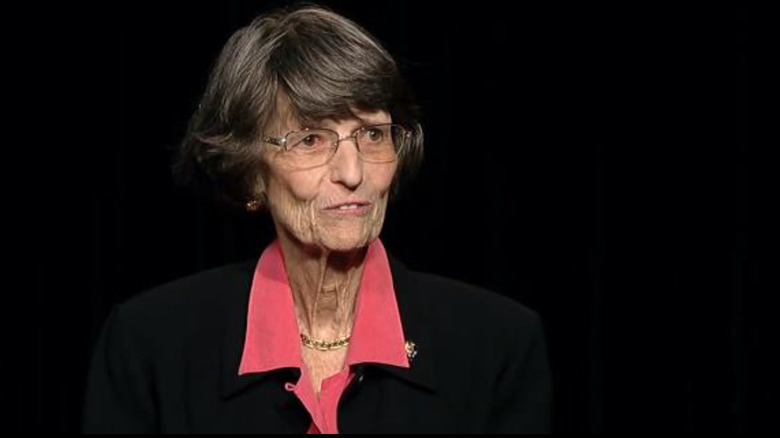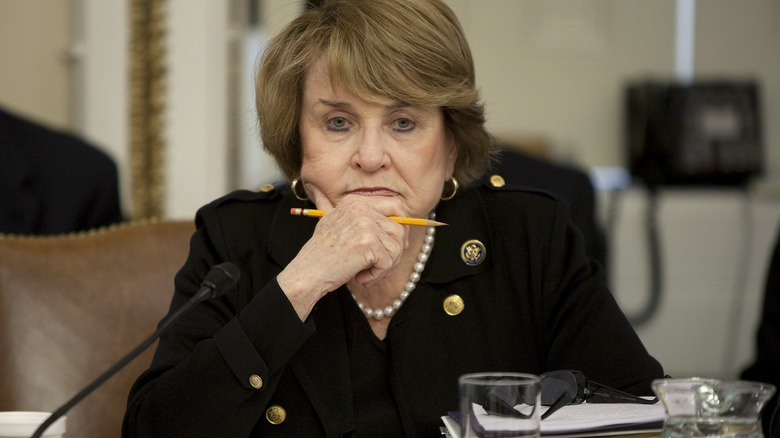The 12 Democratic Women Who Served With Nancy Pelosi Her First Year In Congress
After nearly 20 years of leading Democrats in the House of Representatives, Speaker Nancy Pelosi announced on November 17, 2022, that she would no longer seek a leadership role. Pelosi is the first and only woman to become speaker of the House, an on-and-off role she's held since 2007, reports ABC News. She first rose through the ranks when she was elected minority whip in 2002 and has since seen Democrats lose control of the House in 2010 and regain it in 2018, per The Washington Post. She oversaw the passing of the Affordable Care Act in 2010, the 2021 American Rescue Plan, two impeachments of then-President Donald Trump, and was in office during the January 6, 2021, attack on Capitol Hill (via the official site of Congresswoman Nancy Pelosi).
Pelosi's tenure is historic enough, but during her address to Congress to announce her decision to step down, she took the time to pay tribute to the 12 other Democratic women who served alongside her when she first entered office in 1987 (via the Office of the Clerk). Congress has come a long way since that time, Pelosi noted, and there are now more than 90 Democratic women representatives. And today, most women aren't running to fill the empty seats left by their late husbands, as many did on this list. Read on to learn more about the women legislators in 1987 who paved the way for future generations to come.
Corinne Boggs
On October 16, 1972, House majority leader and Warren Commission member Thomas Hale Boggs, along with Alaska U.S. representative Nick Begich, disappeared en route to Begich's home state, per Politico. Their plane was never found, and although they were reelected posthumously, a special election was held to replace them. No one seemed more fit to replace Boggs than his widow and long-time strategist and confidante, Corinne "Lindy" Boggs (via the U.S. House of Representatives: History, Art & Archives). She easily won the election and proceeded to represent Louisiana's 2nd district, the first woman to do so, until 1991.
During her time in office, Boggs helped found the Congressional Caucus for Women's Issues, a membership organization created to spearhead common causes among other women representatives. She also went on to crusade for women's economic rights and fought to include marital status in an equal rights bill, and she was the first woman to chair the Democratic National Convention in 1976.
A former history teacher, Lindy Boggs was also responsible for the creation of the House Historian's Office and made her mark in Congress as a historian, chairing various commemorative committees. Boggs was hugely popular in her district throughout her career and won most elections by huge margins. After she retired, President Bill Clinton named her U.S. ambassador to the Vatican. She died in 2013 at age 97.
Barbara Boxer
For three decades, Barbara Boxer was the liberal firebrand of Congress. She entered the House of Representatives in 1982 after defeating Dennis McQuaid for California's 6th district, per the U.S. House of Representatives: History, Art & Archives, and immediately made her voice heard.
In 1984, Boxer made national news when she criticized the Pentagon for spending $7,622 on a coffee pot, and when Anita Hill accused Supreme Court nominee Clarence Thomas of sexual harassment in 1991, Boxer and other women representatives led a march on the Senate to demand that Thomas' confirmation hearings be reopened (via the Los Angeles Times). In the aftermath, Boxer and several other women politicians won seats in the U.S. Senate in 1992. That wasn't the last time she fought against the culture of sexual harassment either. In 1995, Boxer disregarded Senate protocol and called for hearings into sexual misconduct allegations against Sen. Bob Packwood before the Ethics Committee did, angering colleagues.
She loved to filibuster, especially on behalf of the environment, and in 1994, she famously held a three-day filibuster on the Senate floor (via CBS News). Boxer was also an outspoken critic of the war in Iraq, something she made known at Condoleezza Rice's confirmation hearing for secretary of state. And, as noted by SFGate, perhaps nothing illustrated Boxer's unabashed style better than her 2004 challenge to Ohio's Electoral College results, which delayed President George W. Bush's re-election. She left the Senate in 2016 but refused to call it a retirement.
Sala Galante Burton
Sala Galante Burton was introduced into politics in the darkest way possible. When she was only 14 years old, her parents fled their home country of Poland to avoid the imminent Nazi takeover, according to the U.S. House of Representatives: History, Art & Archives. Those formative years taught Burton the importance of protecting civil liberties for all people, per The New York Times. She would go on to fulfill this mission as a U.S. representative for San Francisco (5th district), working to boost welfare programs, advocating for immigrants, and criticizing the U.S. invasion of Grenada.
Although Burton had always been involved in Californian politics, she didn't run for national office until the death of her husband, Rep. Philip Burton. She ran in a special election to finish out his term in 1983 and won re-election twice until her death in 1987.
As a U.S. representative, Burton helped create afterschool programs for kids with working parents, protected the environment by restricting off-coast oil drilling, and voted for an extension of the Equal Rights Amendment, reports the Los Angeles Times. She also helped make Martin Luther King Jr.'s birthday a holiday. Burton's connection to Nancy Pelosi was special; it was her district that Pelosi would inherit. As Burton was dying from cancer and unable to perform duties, she endorsed Pelosi to take her seat in a special election. Burton had just won her own election easily weeks before.
Beverly Byron
There were a few peculiarities about Beverly Byron's political career. For one, running for office wasn't her idea. After her husband, Rep. Goodloe Byron, died in 1978, fellow Democrats urged her to run in his place. Even the acting governor of Maryland, Blair Lee, came by her house with the proposal, not a day after Byron's husband's funeral, per The Frederick News-Post. Two, she never raised money for her campaigns. Byron managed to serve for more than a decade in U.S. politics, from 1979 to 1992, without ever having run advertisements against her opponents or run polls to gauge her support, according to the U.S. House of Representatives: History, Art & Archives. But that didn't mean Byron didn't want to be there. While Democratic leaders initially wanted Byron to be a mere stand-in, she intended to serve for the long haul.
Byron's voting patterns were also unique, and she didn't always toe the party line. Like her husband, Rep. Byron was a conservative Democrat and voiced support for (President Ronald) Reagan administration initiatives. And although she voted against liberal favorites, like a nationalized health care system, she also voted for the Equal Rights Amendment in 1983.
Much of Beverly Byron's legacy lies with her support of the military, having served as chair of the Military Personnel and Compensation Subcommittee, which oversees defense spending. But in 1992, political tides were shifting and western Maryland opted for a more steady liberal, causing Byron to lose in the primaries. She was later appointed to the Naval Academy Board of Visitors by President Bill Clinton.
Cardiss Collins
When Cardiss Collins took over for her late husband, Rep. George Washington Collins, in 1973, she became the first African American congresswoman from the state of Illinois, according to the U.S. House of Representatives: History, Art & Archives. She initially didn't want to run for the post and had little political experience, and it took her a few years to find her footing in Congress. She was a soft-spoken individual in an environment where assertiveness is rewarded, and introverts could relate to her struggle. Collins admitted herself that her shyness was the first thing she had to overcome, per the The Washington Post.
Overcame it, she did. She became an advocate for minorities and the working class through employment and welfare initiatives. Rep. Collins was critical of government agencies for failing to practice proper affirmative action, and her efforts led to the passage of a bill that required 10% of concession stands in airports to be run by minorities, per the Archives. As reported by the Post, she even had the temerity to withhold a speaking invitation from President Jimmy Carter at a Congressional Black Caucus fundraiser event — although many had expected him to give a speech — in retaliation for perceived affronts.
Collins retired in 1997, and she died in 2013 at 81 years old.
Marcy Kaptur
As reported by NPR, Marcy Kaptur has the unique distinction of being the longest-tenured woman in U.S. House of Representatives history. She won her first election to represent Ohio's 9th district in 1982 and proceeded to win all of her elections since. She's also never gotten less than 55% of the votes, notes the Toledo Blade.
Before she beat out Republican incumbent Ed Weber for the congressional seat, Kaptur worked as an aide for the Jimmy Carter administration. As a U.S. representative, Marcy Kaptur has spent time helping the agencies and organizations that once spurned her for being a woman. She was rejected from both the U.S. Air Force Academy and the FBI, but she now happily repays them by appointing women to both agencies (via NPR).
Her most recent election, the 2022 midterms, is considered to have been her toughest, the result of her district having been recently redrawn, now including more Republican-leaning voters. According to the Toledo Blade, Kaptur spent more than $2.4 million on her 2022 re-election campaign.
Kaptur seemingly put herself at political risk after being vocally supportive of President Joe Biden, but her opponent, J.R. Majewski, had his own hiccups when it was revealed he had lied about his military service, as reported by NBC News. But Kaptur ended up winning, making her the longest-serving congresswoman in both congressional chambers, and she has no plans to slow down.
Barbara Kennelly
Nancy Pelosi must have taken a few notes from Barbara Kennelly's career. After winning a special election for Connecticut's 1st district in 1981, Kennelly would go on to become the highest-ranking woman of the Democratic Party as vice chair of the Democratic Caucus, according to the U.S. House of Representatives: History, Art & Archives. She was also the first woman to serve as chief deputy whip. Much of Kennelly's legacy came from her work as a member of the powerful Ways and Means Committee, where she pushed legislation to protect child support and penalize payment delinquency. She also sought tax reforms for the insurance industry, benefitting her district, fought to increase the minimum wage, and improve pension laws.
Rep. Kennelly was practically born into politics as the daughter of Democratic National Committee chairman John Bailey, who's considered to have been responsible for John F. Kennedy's presidential victory. Her family had long been part of Connecticut politics, which gave her clout when she ran for Connecticut secretary of state, her first race. Unsurprisingly, Kennelly had greater political aspirations and gave up her seat in the U.S. House of Representatives after nine terms (via the Connecticut Women's Hall of Fame) in order to run for governor in 1998. Unfortunately, Kennelly's campaign came up short and so ended her career in elected office. She has since devoted her time to retirement policy as associate commissioner at the Social Security Administration, which is well up her alley.
Marilyn Lloyd
Marilyn Lloyd was the first Tennessee woman to serve a full term in Congress (via The Washington Post), and at first glance, the role seemed to have been handed to her. After her husband tragically died in a plane crash in 1974 just weeks after winning the Democratic nomination, Lloyd was approached by party leaders to take his place. And if there were some remaining doubt that she could win — Tennessee 3rd district was a Republican stronghold — public sentiment against the Republican party as a result of Watergate washed those away. In fact, one of Lloyd's main opponents dropped out of the race. She proceeded to serve 10 terms as a U.S. representative, plumping her record.
Rep. Lloyd served on the Committee on Science, Space and Technology, where she oversaw the needs of a controversial atomic energy plant in her district, per the U.S. House of Representatives: History, Art & Archives. She sought to become the chair of the committee but was passed over for Rep. William John Hughes, with then-Speaker Thomas S. Foley claiming it was due their last names (and their order in the alphabet).
Although considered a conservative Democrat, Rep. Lloyd fought for women's issues and criticized the military after accusations of sexual abuse. And as a cancer survivor, she also fought to improve breast cancer screening methods. The experience also gave her motivation to protect safe access to abortions. Lloyd decided to retire in 1995 but shocked her party when she chose to endorse a Republican candidate to succeed her.
Mary Rose Oakar
When Mary Rose Oakar first ran for the U.S. House of Representatives in 1976, her opponents were all men who weren't afraid to use sexist remarks to their advantage, according to the U.S. House of Representatives: History, Art & Archives. But Oakar won and once in office, representing Ohio's 20th district, she proudly advocated for issues important to women. Rep. Oakar sponsored two bills to provide equal pay for women, and she's responsible for the creation of the one-dollar coin commemorating Susan B. Anthony.
But Oakar also butted heads with the Democratic Party on a few issues, including abortion, which led to her ostracization from feminist groups. However, she rose to Democratic leadership and served as the secretary of the House Democratic Caucus, where she had to fight against sexist discrimination for access to important meetings.
Oakar's career took a turn in 1992 after she and other U.S. representatives wrote several overdrafts at their in-house bank, with Oakar having used 213 such checks. Although she won her primary the following election, she lost her seat in the general election. In 1995, she was charged with seven felonies after having received $28,000 from her nephew as a campaign donation and then telling the FEC the amount had come from several individual donors, according to The New York Times.
Oakar received probation and other penalties, but despite these setbacks, her political career continued. That same year, President Bill Clinton appointed her to an advisory role, and in 2001, she became a state representative in the Ohio state house, representing the 13th district; she would retire the following year after serving one term.
Elizabeth Patterson
Elizabeth Patterson was the first woman ever to represent South Carolina in the U.S. House of Representatives, per The New York Times. She governed as a conservative Democrat who was mindful of spending and opposed tax increases. Patterson made her mark on fiscal issues and chaired the Conservative Democratic Forum's Task Force on Budget Reform, where she placed restrictions on pork-barrel spending.
Rep. Patterson's job wasn't easy. She was a moderate Democrat, who opposed abortion restrictions and gun laws and supported the death penalty, in a district that heavily leaned conservative, per the U.S. House of Representatives: History, Art & Archives. She won elections by advertising her traditional values but every election was a tightrope to walk, and in her three races, her victories were narrow.
Patterson's first win in 1986 was for an open seat, which she thought would give her an advantage as a newcomer, per the Office of the Historian. But in 1992, her Republican opponent successfully painted her as more liberal than she truly was, accusing her of supporting abortion in extreme cases. She lost the race and went on to run for lieutenant governor of South Carolina, which she lost as well. Patterson later became a political science professor at Spartanburg Methodist College, and she died in 2018.
Patricia Scott Schroeder
Pat Schroeder was once a Capitol Hill star. She was a media darling from day one, having surprised the Democratic establishment with her shocking 1972 win in Colorado's conservative 1st district, appealing to voters with an anti-war message, according to the U.S. House of Representatives: History, Art & Archives. Schroeder was faced with sexist comments from others in Congress as she began her job and was repeatedly undermined by Armed Services Committee chairman Felix Edward Hébert, who wanted to oust her from his committee simply because she was a woman. However, later in her career, Rep. Schroeder managed to persuade the committee to allow women to fly combat missions.
Schroeder fought for women's issues in various ways, having founded the Congressional Women's Caucus and pushed passage of the Equal Rights Amendment; the Pregnancy Discrimination Act, a bill that prevented employee discrimination against pregnant women; and the Family and Medical Leave Act. Despite all that, however, she received criticism from feminists after a 1987 presidential run. When withdrawing from the race, she had become emotional and teared up, and people feared her public tears were a setback for women who wanted to be taken seriously. That episode made Schroeder conclude that people weren't ready for a woman president, per The Colorado Sun.
After 12 terms, Rep. Schroeder decided to retire from elected office and blamed it on her dislike of Newt Gingrich, via Insider.
Louise Slaughter
Before Louise Slaughter died in 2018, she was the oldest member of Congress at 88 years old, according to The Washington Post. She was first elected in 1986 and would go on to form a special bond with Nancy Pelosi. As speaker of the House, Pelosi appointed Slaughter to chair the Rules Committee, the first woman in House history to do so. But Slaughter was known for various other accomplishments in her 31-year career, including her fight for women's issues. In 1991, she and other women legislators protested the Senate, demanding that they reopen a hearing into Supreme Court nominee Clarence Thomas after he was accused of sexual harassment, and in 1994, she co-authored the Violence Against Women Act.
Rep. Slaughter had the unique qualification of being a microbiologist, having received a Master of Science in health (per the U.S. House of Representatives: History, Art & Archives), which became relevant when she fought to regulate the use of antibiotics in the meat industry. She made headlines in 2010 after pushing the Affordable Care Act, which resulted in threats made against her and other Democrats.
Slaughter was also successful in legislating against insider trading, and authored the Stop Trading on Congressional Knowledge Act, which took years to pass. She received tributes from both Democrats and Republicans, all praising her career, after her death, per the Post.

